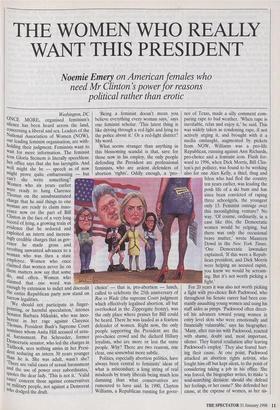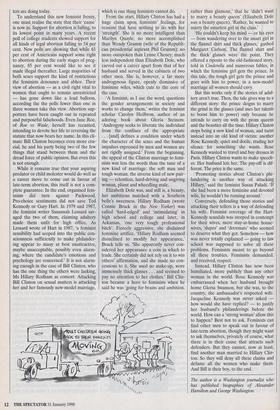THE WOMEN WHO REALLY WANT THIS PRESIDENT
Noemie Emery on American females who need Mr Clinton's power for reasons political rather than erotic
Washington, DC ONCE MORE, organised feminism's Silence has been heard across the land, concerning a liberal and sex. Leaders of the National Association of Women (NOW), OUT leading feminist organisation, are with- holding their judgment. Feminists want to Wait for more information. The feminist icon Gloria Steinem is literally speechless: her office says that she has laryngitis. And Well might she be — speech as of now might prove quite embarrassing but can't she write something? Women who six years earlier were ready to hang Clarence Thomas on the unsubstantiated Charge that he said things to one woman are ready to claim inno- cence now on the part of Bill Clinton in the face of a very long record of lying, a growing train of evidence that he seduced and exploited an intern and increas- ingly credible charges that as gov- ernor he made gross and revolting unwanted advances to a woman who was then a state employee. Women who once claimed that women never lie on these matters now say that some do, and often. Women who claimed that one word was enough by extension to indict and discredit the entire Republican party now stand on narrow legalities. We should not participate in finger- Pointing, or harmful speculation,' intones Senator Barbara Mikulski, who was inco- herent in her rage against Clarence Thomas, President Bush's Supreme Court nominee whom Anita Hill accused of sexu- al harassment. Pat Schroeder, former Oemocratic senator, who led the charges m Tadhook, sees nothing amiss in her Presi- dent seducing an intern 30 years younger than he is. She was adult, wasn't she? There are valid cases of sexual harassment and the use of power over subordinates,' quotes the dear lady. 'This is not it.' Valid Cases' concern those against conservatives (it military people, not against a Democrat who dodged the draft. 'Being a feminist doesn't mean you believe everything every woman says,' says one feminist scholar. 'This latest thing is like driving through a red light and lying to the police about it.' Or a red-light district? My word.
What seems stranger than anything in this blossoming scandal is that, save for those now in his employ, the only people defending the President are professional feminists, who are ardent defenders of abortion 'rights'. Oddly enough, a 'pro- choice' — that is, pro-abortion — lunch, called to celebrate the 25th anniversary of Roe vs Wade (the supreme Court judgment which effectively legalised abortion, all but overlooked in the Zippergate frenzy), was the only place where praises for Bill could be heard. There he was lauded as a fearless defender of women. Right now, the only people supporting the President are the pro-choice crowd and the diehard Hillary loyalists, who are more or less the same people. Why? There are two reasons, one clear, one somewhat more subtle.
Politics, especially abortion politics, have always been central to feminists' ideas of what is misconduct; a long string of real misdeeds by trusty liberals being much less damning than what conservatives are rumoured to have said. In 1990, Clayton Williams, a Republican running for gover- For 20 years it was also not worth picking a fight with pro-choice Bob Packwood, who throughout his Senate career had been con- stantly assaulting young women and using his staff aides as pimps. 'Packwood often direct- ed his advances toward young women in entry level slots who were emotionally and financially vulnerable,' says his biographer. 'Many, after run-ins with Packwood, reacted with shame, doubt and, most important, silence. They feared retaliation after leaving Pacicwood's employ.' They also feared hurt- ing their cause. At one point, Packwood attacked an abortion rights activist, who fought him off but kept silent, to the point of considering taking a job in his office. She was forced, the biographer writes, to make 'a soul-searching decision: should she defend her feelings, or her cause?' She defended her cause, at the expense of women, as her sis- ters are doing today.
To understand this new feminist frenzy, one must realise the state that their 'cause' is now in. Support for abortion is falling, to its lowest point in many years. A recent poll of college students showed support for all kinds of legal abortion falling to 54 per cent. New polls are showing that while 61 per cent of Americans support some right to abortion during the early stages of preg- nancy, 85 per cent would like to see it made illegal thereafter. Large majorities of both sexes support the kind of restrictions the feminists denounce and abhor. Their view of abortion — as a civil right vital to women that ought to remain unrestricted — has gone down like a lead balloon, according the the polls fewer than one in three women take this view. Abortion sup- porters have been caught out in repeated and purposeful falsehoods. Even Jane Roe, of Roe vs Wade, herself has recanted, intending to devote her life to reversing the statute that now bears her name. In this cli- mate Bill Clinton becomes even more cru- cial, he and his party being two of the few things that stand between them and the dread force of public opinion. But even this is not enough.
While it remains true that your aspiring predator or child molester would do well as a career move to come out in favour of late-term abortion, this itself is not a com- plete guarantee. In the end, organised fem- inism did turn against Packwood. Pro-choice sentiments did not save Ted Kennedy or Gary Hart, In 1979 and 1987, the feminist writer Susannah Lessard sav- aged the two of them, claiming adultery made them unfit for high office. As Lessard wrote of Hart in 1987, 'a feminist sensibility had seeped into the public con- sciousness sufficiently to make philander- ing appear to many at best unattractive, maybe unacceptable, possibly even alarm- ing, where the candidate's emotions and psychology are concerned.' It is not alarm- ing enough in the case of Bill Clinton, who has the one thing the others were lacking, Ms Hillary Rodham as consort. Attacking Bill Clinton on sexual matters is attacking her and her famously new-model marriage, which is one thing feminists cannot do.
From the start, Hillary Clinton has had a huge claim upon feminists' feelings, for reasons that have nothing to do with her 'strength'. She is no more intelligent than Marilyn Quayle; no more accomplished than Wendy Gramm (wife of the Republi- can presidential aspirant Phil Gramm); no more outspoken than Lynne Cheney; much less independent than Elizabeth Dole, who carved out a career apart from that of her husband and served in the cabinets of two other men. She is, however, a far more androgynous figure, openly dismissive of feminine wiles, which cuts to the core of the case.
'A feminist, as I use the word, questions the gender arrangements in society and works to change them,' writes the feminist scholar Carolyn Heilbron, author of an adoring book about Gloria Steinem. 'Androgyny seeks to liberate the individual from the confines of the appropriate . [and] defines a condition under which the character of the sexes and the human impulses expressed by men and women are not rigidly assigned.' From the beginning, the appeal of the Clinton marriage to femi- nists was less the words than the tune of a new kind of marriage: the soft man and tough woman, the inverse kind of new pair- ing — relentless, hard-driving and ungiving woman, pliant and wheedling male.
Elizabeth Dole was, and still is, a beauty, her ambitions matched with a Southern belle's sweetness. Hillary Rodham (wrote Connie Bruck in the New Yorker) was called 'hard-edged' and 'intimidating' in high school and college and later, in Arkansas, 'one very tough professional bitch'. Fiercely aggressive, she disdained feminine artifice. 'Hillary Rodham seemed disinclined to modify her appearance,' Bruck tells us. She apparently never con- sidered her appearance a coin in which to trade. She certainly did not rely on it to win others' affirmation, and she made no con- cessions to it. She used no make-up, wore immensely thick glasses . . . and seemed to pay no attention to her clothes.' Bill Clin- ton became a hero to feminists when he said he was 'going for brains and ambition, rather than glamour,' that he 'didn't want to marry a beauty queen' (Elizabeth Dole was a beauty queen). 'Rather, he wanted to marry the smartest girl in the class.'
'He couldn't keep his mind — or his eyes — from wandering over to the smart girl in the flannel shirt and thick glasses,' gushed Margaret Carlson. The flannel shirt and the thick glasses were the point. They offered a riposte to the old-fashioned story, told in Cinderella and numerous fables, in which the feminine girl gets the prince. In this tale, the tough girl gets the prince and goes with him to power, in a new-model marriage all women should envy.
But this works only if the stories of adul- tery aren't true. Then, the tale gives way to a different story: the prince deigns to marry the grind in the glasses (and uses her talents to boost him to power) only because he intends to carry on with the prom queens and the beauties all the time. Hillary Clinton stops being a new kind of woman, and turns instead into an old kind of victim: another Rose Kennedy, quiet and docile, trading her silence for something she wants. Rose Kennedy wanted to travel and buy dresses in Paris. Hillary Clinton wants to make speech- es. Her husband lets her. The pay-off is dif- ferent. The price is the same.
'Promoting stories about Clinton's phi- landering is another way of attacking Hillary,' said the feminist Susan Paludi. 'If she had been a more feminine and devoted wife, he wouldn't be running around.'
Conversely, defending those stories and attacking their tellers is a way of defending his wife. Feminist coverage of the Hart- Kennedy scandals was steeped in contempt for their wives, mere stay-at-home house- wives, 'dupes' and 'doormats' who seemed to deserve what they got. Somehow — how was never totally explained — going to law school was supposed to solve all these problems. Feminists meant to go beyond all these troubles. Feminists demanded, and received, respect.
Instead, Hillary Clinton has now been humiliated, more publicly than any other woman in the world. Rose Kennedy was embarrassed when her husband brought home Gloria Swanson, but she was, to the country, the ambassador's respected wife. Jacqueline Kennedy was never asked — how would she have replied? — to justify her husband's philanderings before the world. How can a 'strong woman' allow this to happen? Best not to ask. Feminists can find other men to speak out in favour of late-term abortion, though they might want to ask themselves, privately of course, what there is in their cause that attracts such defenders. But they cannot, now at least, find another man married to Hillary Clin- ton. So they will deny all these claims and defame all the women who make them. And Bill is their boy, to the end.
The author is a Washington journalist who has published biographies of Alexander Hamilton and George Washington.



































































 Previous page
Previous page